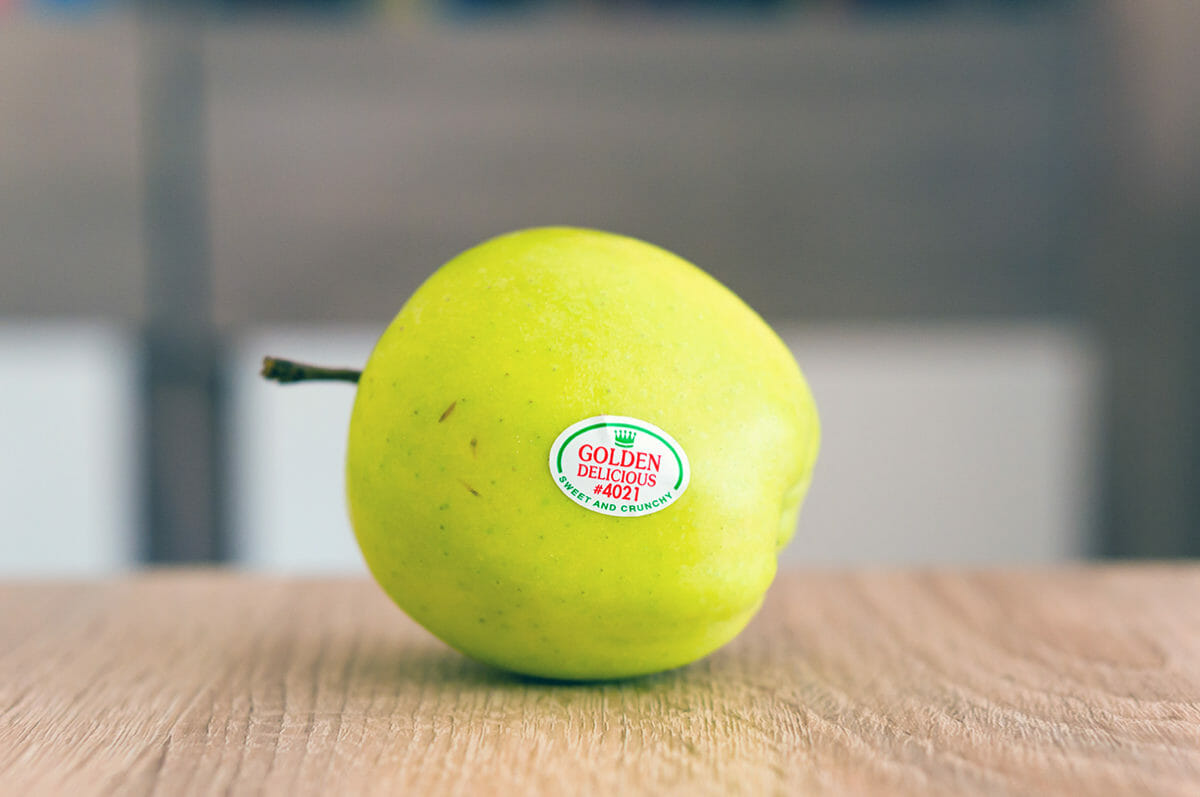Checkout clerks rely on them to ID specific fruits and vegetables, but they're causing major issues at composting facilities.

Those little produce stickers are ubiquitous fruits and vegetables everywhere. But, as CBC notes, they’re actually a significant problem despite their small size.
Produce stickers carry price look-up (PLU) codes. PLU codes are decided on by the International Federation for Produce Standards, and are consistent throughout the world. That’s right: the code for a honeycrisp apple is the same in any grocery store, in any country. This is actually sort of impressive! Why? Most produce does not come with packaging – this is a good thing – which means there has to be some way to convey the specific variety of the item to the checkout clerk. Hence, tiny stickers.
Those stickers can be made of various products, though vinyl and plastic are the most common. They’re regulated by most countries as an indirect food additive, meaning that they have to pass certain tests to prove that they’re not dangerous if accidentally consumed. The stickers aren’t supposed to be edible, and they’re definitely not nutritious, but they’re unlikely to cause any bodily damage.
Where they can cause damage is to the environment. While household composting isn’t quite as widespread in the U.S. as we’d like, it is in Canada. And people who compost are used to simply throwing their fruit and vegetable waste into the compost bin. That is fine for something like an apple, for which you’d peel off and discard the sticker and discard before eating, composting only the core. But this becomes an issue with items where you don’t eat the skin – say, an avocado, or banana. With these, people are just throwing that whole outside in the compost, sticker included.
Therein lies the issue: Produce stickers are a major problem for composting facilities. They don’t break down, and sorting them out from the actually-compostable product is time-consuming and expensive. Being extremely thin and pliable, the stickers pass through screens designed to catch them, and some composting companies single them out as the worst contaminant in their entire chain.
Solutions have been proposed – one company in Sweden laser-etches their avocados – but a more biodegradable solution has not yet been adopted. In the meantime, do your part: PLU stickers in the garbage, produce waste in the compost.
those stickers are disgusting in every way imaginable and need to be eliminated from the system, just like so many other things in our lives.
question about PLU stickers: why are they not made of a compostable/biodegradable material? Surely this is not hard to work out?
why can’t stickers on fruit and vegetables be biodegradeable?
They are banning plastic straws, but not these!!?? All single use plastic should be banned. I use maybe one straw a month, but produce around 6-9 of these stickers in waste per day. Straws:1 Produce stickers: 270.
Get rid of those stupid stickers. Add it to the gigantic list of idiotic stuff that should be eliminated. How can humans be so smart, and yet so stupid.
I have been re-cycyling in Marin County since 1981 and composting in this county for nearly as long. However, those little plastic produce labels are a pain. I understand the dilemma and myself, used to have bad habits regarding them. Just ask my domestic partner of 33 years! Have you ever tried to remove a plastic label from a black banana? A most difficult task I assure you. So I had to re-train myself to immediately remove produce labels immediate once I bring produce home. That way they never end up in the compost or soil or in someone else’s… Read more »
By signing this petition, you will be telling the EPA, FDA, Consumer Advocacy groups, and members of the National Grocer’s Association what you really think about these annoying and unnecessary labels and, at the same time, you will be taking a stand for the elimination of Single Use Plastic (SUP) piece by piece. We advocate elimination of vinyl/plastic labels or replacement with biodegradable, etchings, or fruit wash versions.
https://www.change.org/banproducelabels
hate them!! can never peal them off…..WHY??? WHY??? WHY???
There are biodegradable materials out there, most farmers do not know.
At what point in the supply chain, from banana fields of Colombia to the grocery store in New York, at what point do those stickers get put on?
Would it be the perfect time to take out smuggled cocaine?